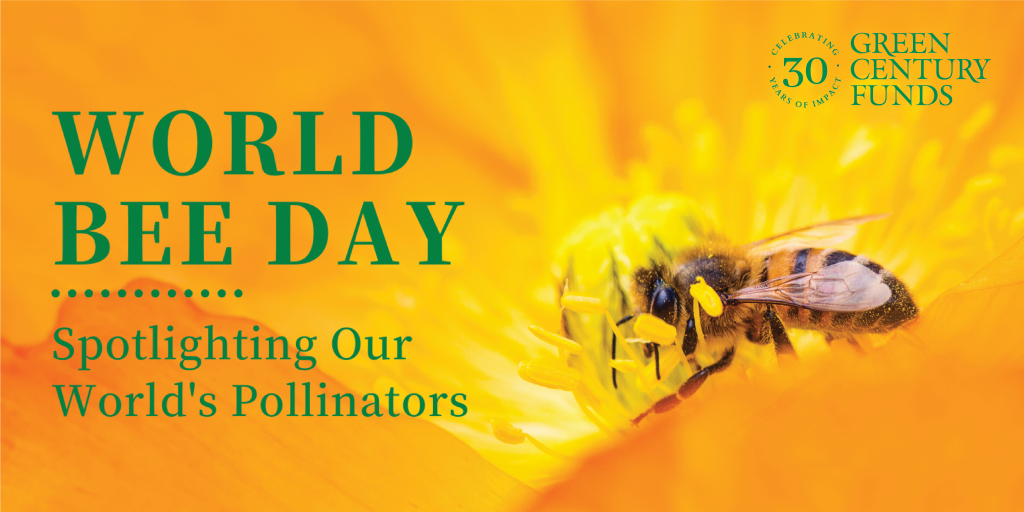Protecting the Bees that Play a Vital Role as Pollinators

Bees are dying off at an unsustainable rate, with serious consequences for our natural world. They play a vital role as pollinators, and losing them would have a devastating ripple effect across all ecosystems. That’s a key reason why we’re working to stop the use of bee-killing pesticides.
Glyphosate is a chemical that causes ecosystem damage by disrupting natural food chains by affecting bees, which are critical plant pollinations. Glyphosate has been found to alter foraging behavior, including making it difficult for bees to navigate back to their hives. The chemical also damages larvae growth in bees and disrupts their gut microbiomes, which make it harder for bees to thrive and do their jobs as pollinators.
The most widely used herbicide in the world, Roundup, has been detected in a stunning 90% of the food products tested by the U.S government. Further, a 2017 study showed that Americans’ exposure to glyphosate increased by 500% compared to exposure in 1996.
The health effects posed by glyphosate are deeply troubling. It has been classified by the World Health Organization as a ‘probable carcinogen,’ and is associated with non-Hodgkin lymphoma. A 2019 study showed that exposure to glyphosate raises the risk of developing non-Hodgkin lymphoma by 41%. Moreover, several studies have shown glyphosate as a reproductive toxicant, and the International Federation of Gynecology and Obstetrics recommends a global phase out of the product due to these risks.
Bayer, the parent company of Monsanto which manufactures Roundup, paid $10 billion to settle 95,000 claims that Roundup significantly contributed to the development of cancer. The basis for most of these claims stemmed from insufficient warning of the potential health risks, or the lack of recommendations for protective equipment for those who use the product frequently. The company continues to sell these products without warning labels.
Despite the danger to pollinators and people, glyphosate continues to be sold for use on lawns and gardens. These sales of glyphosate-based products also pose material risks to the companies that distribute them. That’s another reason why in the past year Green Century° worked with two of the world’s largest home improvement retailers – Home Depot* and Lowes* – and competitor Tractor Supply Company* to push for the phase-out of glyphosate-based products from their shelves.
Green Century met with these three home improvement retailers to discuss their exposure to litigation and regulatory risks and we filed a shareholder resolution with Home Depot, which agreed to make natural pesticide products more accessible to consumers.
Though the home improvement industry still has a way to go to protect both pollinators and consumers from glyphosate, we’re glad to report this progress. Green Century will continue to press companies for a complete phase-out of glyphosate-based products in the coming year.
About Green Century Capital Management
°Green Century Capital Management, Inc. (Green Century) is the investment advisor to the Green Century Funds (The Funds). The Green Century Funds are the first family of fossil fuel free, responsible, and diversified mutual funds in the United States. Green Century Capital Management hosts an award-winning and in-house shareholder advocacy program and is the only mutual fund company in the U.S. wholly owned by environmental and public health nonprofit organizations.
*As of March 31, 2021, The Home Depot, Inc. comprised 1.11%, 1.86%, and 0.00%; Tractor Supply Company 1.03%, 0.12%, and 0.00%; and Lowe’s Companies, Inc. 0.00%, 0.79%, and 0.00% of the Green Century Balanced Fund, the Green Century Equity Fund and the Green Century International Index Fund respectively. As of the same date, other securities mentioned were not held in the portfolios of any of the Green Century Funds. References to specific securities, which will change due to ongoing management of the Funds, should not be construed as a recommendation by the Funds, their administrator, or their distributor.
You should carefully consider the Fund’s investment objectives, risks, charges, and expenses before investing. To obtain a Prospectus that contains this and other information about the Funds please click here, email info@greencentury.com, or call 1-800-934-7336. Please read the Prospectus carefully before investing.
Stocks will fluctuate in response to factors that may affect a single company, industry, sector, country, region or the market as a whole and may perform worse than the market. Foreign securities are subject to additional risks such as currency fluctuations, regional economic and political conditions, differences in accounting methods, and other unique risks compared to investing in securities of U.S. issuers. Bonds are subject to a variety of risks including interest rate, credit, and inflation risk. A sustainable investment strategy which incorporates environmental, social and governance criteria may result in lower or higher returns than an investment strategy that does not include such criteria.
This information has been prepared from sources believed reliable. The views expressed are as the date of this writing and are those of the Advisor to the Funds.
The Green Century Funds are distributed by UMB Distribution Services, LLC. 235 W Galena Street, Milwaukee, WI 53212. 5/21

